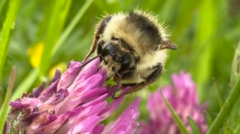Is a Rare Bumblebee Spotted at the Nature Reserve a Sign of Hope?

Rare Bee Species Discovery in Wales: The Shrill Carder Bee
The discovery of one of the UK's rarest species of bees, the shrill carder bee, at Bridewell Common reserve in South Wales marks a significant milestone in wildlife conservation. This event not only highlights the importance of local efforts to restore natural habitats but also shines a light on the ongoing challenges faced by endangered species. The sighting, reported by Gwent Wildlife Trust (GWT) volunteer Bob Roome, represents a hopeful sign for both the bee and the broader ecosystem it supports.
The Importance of the Shrill Carder Bee
The shrill carder bee (Bombus sylvestris) is a species of bumblebee that has seen a drastic decline in its population over the last century. Once prevalent in lowland areas across the UK, it has become incredibly rare, with fragmented populations remaining only in a few locations such as South and West Wales, Kent, Essex, Somerset, and Wiltshire. The buzzing sound of the shrill carder bee, which gives it its name, is a characteristic feature that many have unfortunately lost the opportunity to hear. This bee plays a critical role in pollination, contributing to the health of wildflowers and the agricultural economy.
Factors Contributing to Population Decline
The decline of the shrill carder bee can be attributed to several factors, including:
- Habitat Loss: The vast majority (98%) of flower-rich meadows in Wales and England have disappeared over the past century. This loss of habitat has been detrimental to the survival of the shrill carder bee, which relies on diverse flora for food.
- Climate Change: Changing weather patterns can disrupt the life cycles of both bees and the flowers they pollinate, leading to mismatches in availability.
- Pesticide Use: The use of pesticides in agricultural practices can have harmful effects on bee populations, reducing their numbers and health.
Conservation Efforts at Bridewell Common Reserve
The sighting of the shrill carder bee at Bridewell Common reserve is a testament to the effectiveness of the conservation efforts undertaken by Gwent Wildlife Trust. Since taking over the reserve six years ago, GWT has implemented several strategies to restore and enhance the environment for local wildlife:
- Seed-Rich Hay Spreading: By introducing seed-rich hay, GWT aims to increase the variety of wildflower species, which are essential for the foraging needs of the shrill carder bee.
- Late Summer Cutting and Grazing Management: Establishing a consistent regime of late summer cutting and grazing helps maintain the health of meadows, promoting the growth of native plant species.
- Restoration of Ditches: Restoring natural watercourses contributes to a more diverse ecosystem, providing habitats for various species, including the shrill carder bee.
The Role of Volunteers in Conservation
Volunteers like Bob Roome play a vital role in the success of conservation projects. Their dedication and hard work help monitor wildlife, maintain habitats, and engage the community in conservation efforts. The sighting of the shrill carder bee is not just a victory for the GWT team, but a sign that collective efforts can lead to positive change in the environment.
The Need for Continued Conservation Efforts
While the discovery of the shrill carder bee at Bridewell Common is an encouraging development, it highlights the ongoing need for conservation work throughout the UK. Preserving and restoring habitats is crucial for the survival of not only this species but many others that face similar threats. The loss of biodiversity has far-reaching implications, affecting ecosystem stability and resilience.
How You Can Help
Individuals interested in supporting bee conservation and promoting biodiversity can take several meaningful actions:
- Plant Native Flowers: Creating bee-friendly gardens filled with native wildflowers provides essential food sources for bees.
- Reduce Pesticide Use: Opting for organic gardening practices can help protect bee populations.
- Support Conservation Organizations: Donating or volunteering with local wildlife trusts and conservation groups can make a significant impact.
Understanding the Ecological Impact of Bees
Bees play an integral role in pollinating plants, which is essential for food production and maintaining healthy ecosystems. The decline of bee populations has a cascading effect on various aspects of the environment:
- Food Security: Many crops depend on bee pollination, and a decline in bees can lead to reduced yields and increased food prices.
- Biodiversity: Bees contribute to the pollination of wild plants that provide habitat and food for other wildlife.
- Climate Resilience: Healthy ecosystems that include diverse plant and animal species are better able to withstand climate change impacts.
Frequently Asked Questions
What is the shrill carder bee?
The shrill carder bee (Bombus sylvestris) is one of the rarest bumblebee species in the UK, known for its high-pitched buzz and preference for flower-rich habitats.
Why is the shrill carder bee endangered?
Factors such as habitat loss, climate change, and pesticide use have led to the significant decline of the shrill carder bee population.
How can I help protect bees in my area?
You can help protect bees by planting native flowers, reducing pesticide use, and supporting local conservation organizations.
What are the benefits of bees to the ecosystem?
Bees are crucial for pollinating plants, which supports food production, maintains biodiversity, and contributes to ecosystem resilience.
Where can I find shrill carder bees?
Shrill carder bees are found in specific regions of the UK, including South and West Wales, Kent, Essex, Somerset, and Wiltshire, primarily in flower-rich meadows.
The sighting of the shrill carder bee at Bridewell Common reserve underscores the importance of dedicated conservation efforts and the resilience of nature. As we continue to face environmental challenges, it is critical to recognize the role each species plays in our ecosystem and take action to protect them. What steps will you take to support local wildlife? #BeesMatter #ConservationEfforts #Biodiversity
Published: 2025-08-06 17:10:15 | Category: wales


